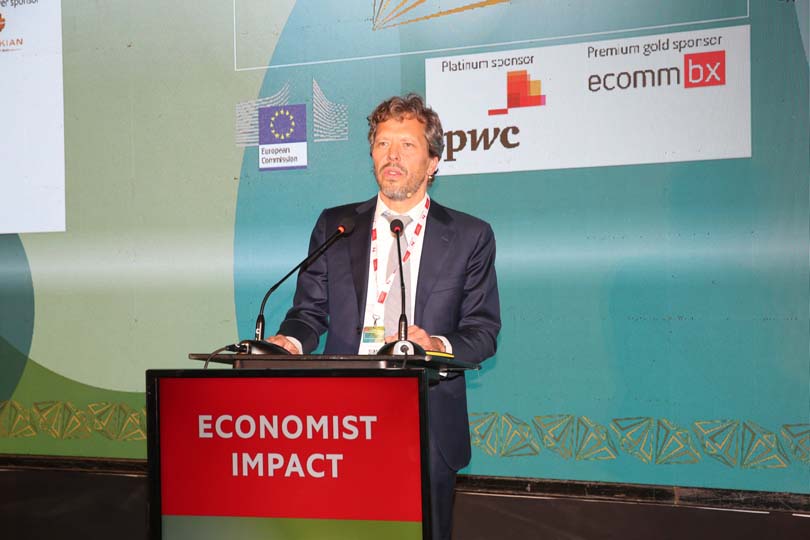

Panayiotis Rougalas
Moody's believes that Cyprus' small and saturated banking sector, the banks' limited loan portfolio, and low fee and commission income will restrict opportunities for growth in domestic banks' activities and profitability in the long term. Speaking at the Economist's 19th annual conference, Moody's Investors Service Deputy Managing Director Simon Ainsworth, in collaboration with "communication sponsor" Kathimerini newspaper, commented on the limited impact on the asset quality of Cypriot banks from rising interest rates and inflation. After assessing the profitability of Cypriot banks, he noted that while domestic banks will reach their peak profitability in 2024, it is expected to decline over time. Ainsworth also suggested that conservative loan demand might limit the role banks play in fostering growth. During his speech, Moody's rating agency chief pointed out, "No new NPLs have been created, although the risks from old ones persist." Regarding the Cypriot economy as a whole, he emphasized its strength, with the House forecasting a 2.8% GDP growth for 2024. Ainsworth specifically highlighted the capital buffers of Cyprus's two systemic banks, Bank of Cyprus and Hellenic Bank, underscoring their protection through strong capital buffers. He noted that the Bank of Cyprus maintains a CET1 ratio of 16% and a leverage ratio of 7.2%, while Hellenic Bank boasts 20% and 10%, respectively. Moody's Investors Service deputy managing director Simon Ainsworth.
Moody's Investors Service deputy managing director Simon Ainsworth.
Risks Remain
The view that the global economy has displayed resilience, despite lingering risks, was expressed by Wim Van Aken, the head of the European Stability Mechanism mission to Cyprus. In his address, he highlighted the current period of extreme uncertainty in the global economy, driven by the aftermath of the pandemic, conflicts in Eurasia and the Middle East, and the rise in interest rates. For Europe and Cyprus, Van Aken remarked that the Eurozone economy and the financial system have proven resilient in the face of the energy crisis and inflation. He noted Cyprus's strong economic performance, which remains relatively robust compared to the euro area average, even though it has weakened compared to the previous year. Simultaneously, he mentioned that annual inflation is projected to decline significantly in 2023, falling below euro area levels. The Head of Mission of the European Stability Mechanism in Cyprus, WimVan Aken
The Head of Mission of the European Stability Mechanism in Cyprus, WimVan Aken
Cyprus has also been fiscally prudent and able to create fiscal space. Prudent use of energy-related measures has significantly improved Cyprus's fiscal position, leading to a further reduction in government debt. Van Aken pointed out, "Strong reform efforts over the last decade have benefited the economy. Countries, including Cyprus, have undertaken critical reforms to address macroeconomic vulnerabilities." In Cyprus, the banking sector finds itself in the strongest position of the last decade. Higher interest rates have driven increased earnings, resulting in solvency ratios above the euro area average, and maintaining resilient asset quality. Van Aken noted that rating agencies have upgraded Cypriot banks, reflecting the improved situation. However, he cautioned that while there has been significant progress in reducing old NPLs, they still remain higher than the EU average. Additionally, non-bank NPLs continue to pose a challenge, impacting new lending opportunities and bank profitability. The resolution of NPLs is contingent on the effectiveness of the divestment framework, and concerns arise from numerous legislative proposals that could undermine its effectiveness and the lack of implementation in Cyprus. Delays in the foreclosure framework further hinder the resolution of bad loans, leaving economic uncertainty. Elizabeth McCaul, member of the Supervisory Board of the European Central Bank.
Elizabeth McCaul, member of the Supervisory Board of the European Central Bank.
Lessons from the Crisis
Elizabeth McCaul, Member of the Supervisory Board of the European Central Bank, emphasized in her speech that the lessons from the 2007-2008 crisis have been integrated into supervisory mechanisms, making the industry more resilient. She presented a picture of stability for European banks in the wake of the pandemic, the war in Ukraine, and the current situation, including military tension between Israel and Hamas. Under the supervision of the European Central Bank (ECB), banks exhibit strong capital adequacy, high liquidity coverage ratios, and profitability. Stress tests signal that banks are resilient in the face of potential crises. She also noted the benefits of rising interest rates but cautioned about increased funding costs and highlighted risks in the US. McCaul stressed the importance of adequate capital, a stable outlook, and improved supervision, particularly for US regional banks, given their increased interconnectedness. The ECB closely monitors risks and, combined with economic stability in Europe, promotes bank resilience. The CEO of the fintech company, ECOMMBX, Michael Charalambides.
The CEO of the fintech company, ECOMMBX, Michael Charalambides.
A Look at the Digital Euro
The digital euro was a focal point of Michael Charalambides, CEO of ECOMMBX, who emphasized that trust has always been the essence of money. He described "fintech" as democratizing access to financial services and stressed the need to prepare for a cashless world. He clarified that the digital euro is not a cryptocurrency but offers faster transactions, reduced costs, and the potential for Europe to set a global standard. Challenges lie in security, privacy, and community education, which need attention. Charalambides viewed the digital revolution in finance as a future that connects people, new ideas, and dreams, emphasizing that it's not just about numbers. He concluded that the digital euro can become the beacon of European integration.
[This article was translated from its Greek original and endeavors to convey the author's message intended by its Greek original]
































